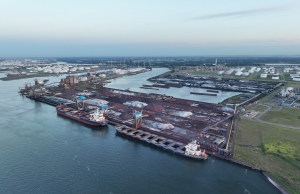


(Posted on 05/01/24)
The recent disruptions at the Red Sea entrance are anticipated to exert additional strain on the Port of Rotterdam’s container terminals in January 2024. However, the overall impact on the port of Rotterdam's throughput is projected to be minimal. The Port of Rotterdam Authority foresees a decrease of approximately 1.25 million tonnes in the 2023 throughput figures, primarily due to the delays around the year-end transition. This anticipated decline is expected to positively influence the results for 2024.
In recent weeks, numerous sea-going vessels, predominantly container ships from the Middle East and South East Asia, have been rerouted to pass the Cape of Good Hope. Consequently, container ships are experiencing an extended voyage duration of eight to twelve days. Bulk carriers, which typically maintain an average speed of 24 kilometres per hour compared to the usual 33 kilometres per hour, are facing delays of eleven to eighteen days. The shipping distance between Singapore and Rotterdam through the Suez Canal is 8,288 nautical miles (15,349 km), while the route via the Cape of Good Hope spans 11,755 nautical miles (21,770 km).
The Port of Rotterdam Authority’s projections indicate a reduction of approximately 1.25 million tonnes in throughput volume for December due to these disruptions. For context: the total throughput volume at the port of Rotterdam in 2022 amounted to 467 million tonnes.
The Port of Rotterdam Authority estimates that container throughput during the final fortnight of December will witness a decline of about 65,000 TEU, equating to roughly 0.65 million tonnes. The potential impact on liquid bulk transhipment, including oil, oil products, and palm oil, is assessed by the Port of Rotterdam Authority to be a maximum of 0.5 million tonnes. Although around 2.4 million tonnes of Rotterdam’s liquid bulk typically transit through the Suez Canal each month, not all bulk carriers have opted for rerouting. Approximately 0.5 million tonnes of dry bulk, including commodities such as coal and iron ore, are transported through the Suez Canal to Rotterdam monthly. The Port of Rotterdam Authority anticipates a maximum impact of approximately 0.1 million tonnes on this category of cargo.
With this year’s Rail Conference “Rail Freight Transport and Seaports”, a joint initiative... Read more
Asian Bulk Logistics (ABL Group) and ICG have jointly announced the successful completion of ABL&rsquo... Read more
Abu Dhabi based AD Ports Group, a leading global enabler of integrated trade, industry and logistics... Read more
The Executive Board of Hamburger Hafen und Logistik AG (HHLA) has appointed Patrick Krawutschke as Managing... Read more
Abu Dhabi based AD Ports Group, a global enabler of integrated trade, transport, industry, and logistics... Read more
This year marks a significant milestone in maritime innovation as Port Hedland, Australia, celebrates... Read more
Associated British Ports (ABP), the UK’s leading port operator, has announced the latest tranche... Read more
During the Investment, Labour, and Trade Promotion Programme in Japan (November 16–22, 2025),... Read more
AD Ports Group subsidiary Khalifa Economic Zones Abu Dhabi - KEZAD Group, the largest operator of integrated... Read more
Abu Dhabi based AD Ports Group, a global enabler of integrated trade, transport, industry, and logistics... Read more